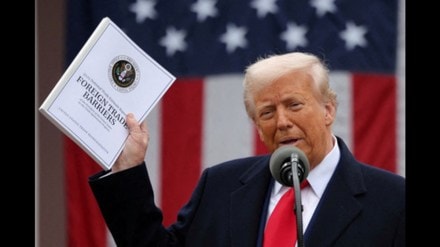Ever since President Donald Trump announced sweeping tariffs on products imported to the US, the global market has suffered a massive meltdown. With the ‘Black Monday‘ chaos in full swing, Tokyo’s Nikkei 225 slumped to its lowest in over 18 months. India’s Dalal Street suffered a similar fate with the Sensex and Nifty falling more 5% in pre-open trade.
Before trading resumed on Monday, Donald Trump said nations were dying to make a deal with him over the new tariff regime. However, the POTUS decided to “hang tough,” declaring that he would not be backing down on his tariff plan. As a result, comparisons with the Great Depression-era Smoot-Hawley Act have rung in loud. Business Insider also reported that the dramatic rise in tariffs under the Trump administration marks the rise to the highest levels in nearly a century. “The last time tariffs were this high followed the Smoot-Hawley Tariff Act of 1930,” the report added.
Trump tariffs compared with Smoot-Hawley Tariff Act of 1930
The Smoot-Hawley Tariff Act of 1930 was signed into law by President Herbert Hoover after the 1929 stock market crash despite over a thousands economists’ petition advising against it. The bill was sponsored by Senator Reed Smoot of Utah and Rep Willis Hawley of Oregon. The decision fell into place to save American farmers and manufacturers against European imports. However, it soon saw itself struggling when faced with debts.
With import duties already high, the act further raised these numbers on foreign agricultural products and manufactured good by an additional 20% on average. Consequently, other countries also raised their tariffs retaliating the US flip decision. Americans exports ultimately slipped by 28-32%.
If tomorrow, the S&P 500 falls more than 4% for the third day in a row, it'll be for the first time since the great depression. pic.twitter.com/7n8ql1csIR
— Maine (@TheMaineWonk) April 6, 2025
Experts on Trump tariffs and Great Depression comparisons
Eric Rauchway, a historian and professor at the University of California Davis, told the Business Insider, Trump’s tariffs “represent a complete reversal of how the United States has dealt with the question of global trade for the better nine tenths of a century.”
“By 1948, it become consensus belief across US political parties, and indeed throughout the world, that tariffs had helped cause the Great Depression and the Second World War,” he continued. “The policies we’ve had since then have been intended to avoid a repeat of those things.”
The cross-border trade wars and immensely high tariff laws reduced the volume of world trade, Rauchway highlighted. “And that’s bad because the Depression was a global phenomenon and a lot of people needed to sell into other markets for their economies to recover.” The expert also noted that the tariff announcement has served its role as a time travel machine, as the Republican party has embraced its pro-tariff roots which were established ahead of the Great Depression.
Behind every great depression/recession proudly stands a Republican, blaming someone else!
— Alex Cole (@acnewsitics) April 5, 2025
Similarly, Nilesh Shah, a mutual funds and markets commentator, sounded the alarm on the US potentially setting itself up for a major economy disaster. Shah turned his attention to 1828 and 1930 in an X post, saying that the tariff policies could push the US to “hard landing.” He added, “If US markets are correcting, US consumption, which accounts for two-thirds of the economy, could come under pressure due to higher inflation and the evaporating wealth effect.”
Trade experts at the Cato Institute – think thank promoting free markets – Scott Lincicome and Colin Grabow also compared the US tariffs to the Smoot-Hawley Tariff Act of 1930. As quoted by Indian Express, they said in a statement, “With today’s announcement, US tariffs will approach levels not seen since the Smoot-Hawley Tariff Act of 1930, which incited a global trade war and deepened the Great Depression.”
Donald Trump just caused:
— Tristan Snell (@TristanSnell) April 7, 2025
— The biggest tax increase since 1968
— The biggest tariff increase since 1930 and the Great Depression
— What is about to be the worst 3-day stock market decline since the Great Depression
Saturday Night Live also takes a swing
On top of that, Saturday Night Live reimagined Donald Trump’s tariff announcement on Liberation Day with James Austin Johnson stepping in as the president. Even the satirical sketch comedy series hit back against Trump’s policies, suggesting that it would “make America Great Depression again.”
Taking a dig at the POTUS’ imposition of taxes on a group of uninhabited islands with penguins as its sole residents, Johnson’s Trump announced no country would be “safe” from the tariff regime. “Can you imagine that, a Big Mac in a Hula skirt? Ooh la la,” the actor posing as the Republican leader joked.
MAGDA! Make America Great Depression Again pic.twitter.com/vQ3puQMxfD
— Blue Georgia (@BlueATLGeorgia) April 6, 2025
